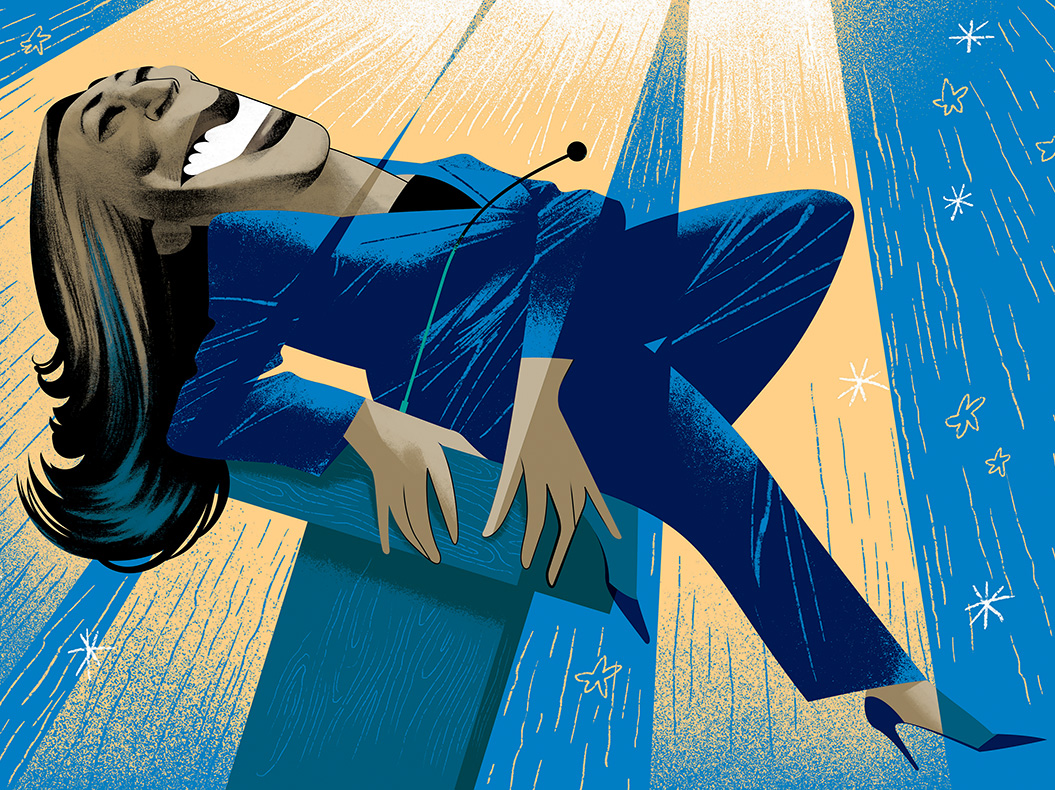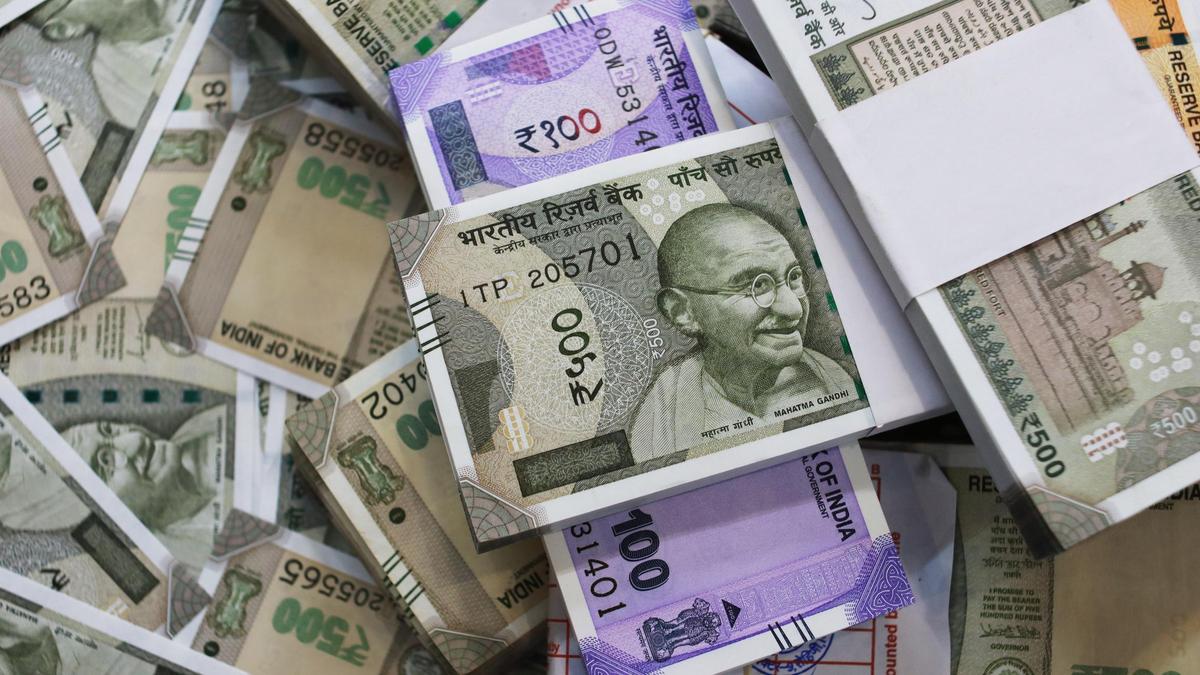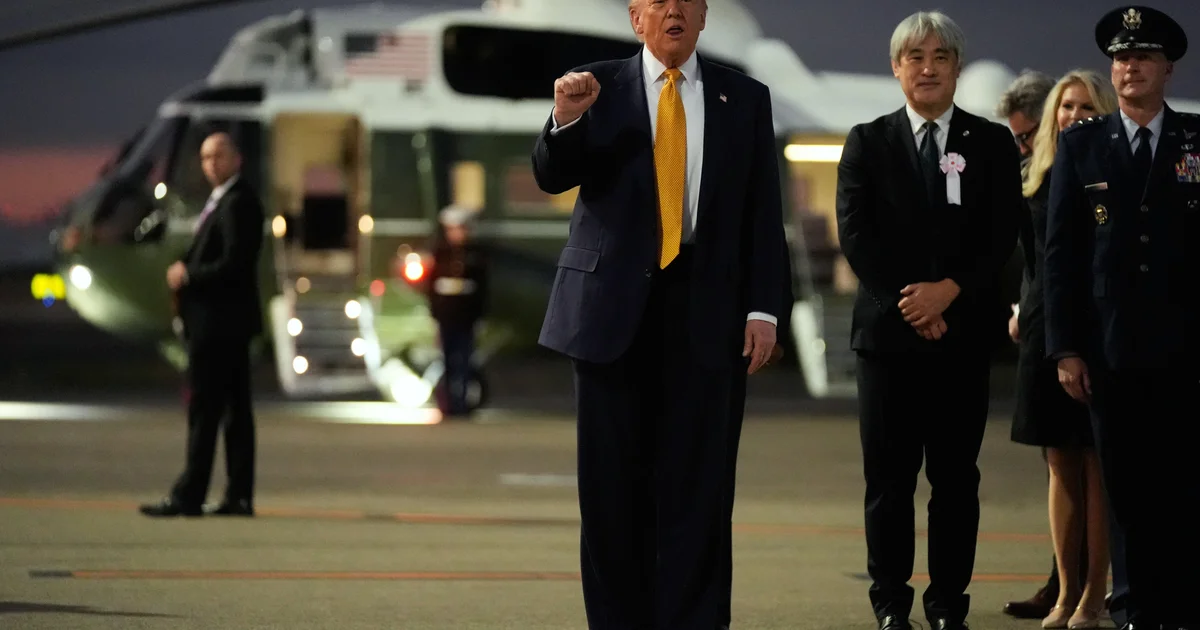Copyright newstatesman

London’s Southbank Centre is in lockdown. It is usually a heaving hub for passers-by stopping for a coffee and a warm place to sit along the Thames, but tonight it is firmly ticket-holders only. An unsmiling security guard is swiping attendees with a metal detector before they have their bags searched. An elderly gentleman tells me he queued for more than half an hour “in the freezing cold” just to enter the venue. Once inside, I am immediately told off for trying to use the loos on the wrong side of the building. The atypical emptiness of the vast space, where brutalism meets Escher, feels post-apocalyptic. All the zigzagging concrete stairways need is a mob of loping zombies. The walking dead ambience isn’t entirely incongruous. We are here to see Kamala Harris, who has risen almost a year after Donald Trump buried her in the 2024 US presidential election. Harris is on tour promoting her book 107 Days, a reflection (or, perhaps, apologia) of her truncated and decidedly unsuccessful campaign. London is the one non-American pitstop, and reflecting the message that this is a literary event, not a discussion about politics, Harris is in conversation not with a leading journalist or grandee of British politics, but with the award-winning Nigerian author Chimamanda Ngozi Adichie. Kamala fever has come to London. Everyone is simply buzzing at having landed a ticket to this sold-out event – except perhaps my cold, elderly queue companion. “I saw Obama at the O2,” he says with pride, then whispers conspiratorially that he heard Harris had initially scoped out the 20,000-capacity O2 Arena for her event – only to settle on the Royal Festival Hall, which has a more modest capacity of 2,500. I spot a couple in matching T-shirts that each bear a dizzying collection of Kamalas (I count five faces and, unnervingly, three hands) and a lot of purple glitter. Apparently, they are not official Harris merch but purchased from Etsy. Harris is nearly half an hour late. While we wait, a giant screen projects photos from the campaign trail: Harris with Obama, Harris on Saturday Night Live, a lime green sign declaring “Kamala is brat”. When she finally struts on to the stage, to the tune of “On My Mama” by Victoria Monét (“When they say, ‘She get it from her mama’/I’ma say, ‘You fuckin’ right’/Body rude, it’s unpolite/Done being the humble type”), the crowd goes wild. Then, the standing ovation is pierced by high-pitched squeals; some attendees glance around with concern. Has the fire alarm gone off? But no, it’s the trademarked “skee-wee” call of her black sorority, Alpha Kappa Alpha. It’s all a bit Legally Blonde (“I once had to judge a tighty-whitey contest for Lambda Kappa Pi. Trust me, I can handle anything!”). But then, like Reese Witherspoon’s perky heroine Elle Woods, Harris is a sorority sister, bursting with belief in the power of female solidarity, who studied law and wants to right America’s injustices. Skee-wee! “This is a space that’s full of love and appreciation for you,” Adichie croons, and then the Gaza protests start. A young woman has smuggled in a banner and is shrieking: “Kamala Harris, you have blood on your hands!” She is dragged away by security. “Kamala Harris, shame on you!” bellows a man on the other side of the hall, picking up the baton. Two others start screaming “war criminal” and “genocide”. While security scrambles, the impatient audience tries to drown them out with boos and claps. An auditory stand-off is reached, until the audience seizes the upper hand with a rousing chorus of “Happy Birthday”. (Harris turned 61 three days before the event.) Eventually, the protesters are removed and calm descends. Harris solemnly accepts “our administration should have done more”, then offers a stern defence of her record as vice-president regarding the war in Gaza, concluding: “I appreciate the emotion… And now I’d like to move on.” Why does Harris think she lost the election? What lessons does she have for her party, which seemed (and seems) structurally and stubbornly inept at countering the threat of Donald Trump? Does she have a message for her bruised and defeated acolytes who are devastated at what Maga 2.0 is unleashing? The answers, according to Harris, are: not enough time; “work on the deep stuff”; and something about the spirit remaining undefeated. At one point, she reminds the audience that “two thirds of the American electorate did not vote for this”; at another, that this was not just the shortest presidential campaign in history (thanks to Joe Biden refusing to give way), but also the closest in vote numbers in the 21st century. Leaving aside the fact that she’s omitted the 2016 election – when Hillary Clinton won the popular vote by 2.8 million but lost the electoral college – it’s unclear what we are meant to take away from this: that there’s no need to reflect on why the Democrats failed to win not only the presidency, but the House and the Senate as well? That a victory in “spirit” is some kind of compensation for a crushing defeat in reality? Perhaps this is unfair. Harris did not get an easy ride. Biden’s stubbornness left the Democrats scrambling three months out from polling day. And her gripes about the US media landscape are not just sour grapes: the decisions by the owners of both the Washington Post and the LA Times not to publish their drafted endorsements of Harris smack of corporate cowardice. (Whether those endorsements would have made any difference is another matter.) There is a fascinating story to be told about how the Democratic Party – along with much of corporate America – lost itself in a Trump-induced tailspin, and what can be done about it. As vice-president during the four-year Trump interregnum, Harris is almost uniquely qualified to tell that story. But it’s not a story she’s interested in. Adichie wants “to talk about my personal quarrel with the Democratic Party”. Harris doesn’t. Adichie tries again, calling the Democrats “self-righteously ineffective”. Harris, maintaining her pep, reminisces about how great it felt to use Beyoncé’s anthem “Freedom” as her walk-on song. She doesn’t want to talk about foreign policy either. When Adichie moves the conversation back to Palestine, Harris tenses: her legs cross, her expression freezes – surely this topic was adequately covered at the start? “I did not have the final say in that,” she insists. “If I had, things would have been different.” The mood is tense again. Adichie sweeps in to orchestrate a vibe shift: “So! Will you do a cookbook?” This is what the audience are here for: not a deep dive into the toxicity of US politics, nor an autopsy of the last election, but a group therapy session. Harris, safely ensconced in this space of “love and appreciation”, is only too happy to oblige. Even when she warns that “it may get worse before it gets better” – “it” being the stripping away of American democratic norms; Immigration and Customs Enforcement agents kidnapping people in the street; national security discussions playing out on private webchats; the capitulation of once-great US institutions; and the bulldozing of half the White House to make room for a gilded ballroom – she finds a positive spin. Maybe the conversation should be not about hate, but about love? “We could have a whole discussion about ‘what is love’,” Harris muses. Her closing gambit is that it wasn’t all for nothing. “We also, in those 107 days, built something,” she soothes the mostly British audience – who couldn’t have voted for her, however much they may have wanted to. “We see the darkness, but we also carry some light.” Elle Woods couldn’t have said it better. [Further reading: Looking for Growth looks for a political consensus]



